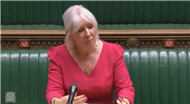One of the first MPs to get coronavirus reveals she's los antibodies after 12 WEEKS

HEALTH minister Nadine Dorries has revealed she is no longer immune from Covid despite contracting it in March.
She sparked a panic in Westminster when she was one of the first MPs to get the bug – more than two weeks before the country was plunged into a 'stay at home' lockdown.
⚠️ Read our coronavirus live blog for the latest news & updates
Experts have said there is no way to be sure that people who have caught the virus won't get it again – but they think there is some level of antibodies which last temporarily.
It's unclear how long these might stay in the body for, and scientists are divided over whether someone can become immune or not.
Ms Dorries has said she no longer has antibodies in her system.
She told the Commons last night: "On the issue of herd immunity, without a vaccine, how do we attain herd immunity? With no knowledge of immunity of coronavirus, how do we obtain herd immunity?
"And I will share with the House, I was diagnosed with coronavirus on March 7, I had a very severe dose and my antibodies had disappeared 12 weeks later.
"I am no longer immune to coronavirus.
"And that is not just my story, that's the story of many, many people."
She added: "If you do not have long-term antibodies, if you have no vaccine, there is no such thing as herd immunity."
Fresh research out earlier this month showed that around one in ten Londoners may have antibodies.
Recent data from Public Health England shows a prevalence of coronavirus antibodies among blood donors as high as 13.4 per cent.
But they are unlikely to last too long – meaning if someone has had the virus they will likely not become immune to it.
That means that it's likely social distancing and extra protection such as masks will likely have to stay in place until a vaccine is found.
Scientists are making promising progress towards one, with the hopes that doses could be dished out to the public in the coming months.
However, it's not likely to be a once-only jab, and people are expected to be told to have to get regular top ups to ensure they stay healthy and free of the virus.
But Professor Jon Cohen, Emeritus Professor of Infectious Diseases at Brighton and Sussex Medical School, said in March that it is “very likely" based on other viral infections that "once a person has had the infection they will generally be immune and won’t get it again."
Others have said people could get it a second time, but it's likely to be very mild if they do.
There have been a handful of cases around the world of people supposedly catching the bug twice.
But it is possible to get a false positive test just as it is possible to get a false negative one.
Most read in Politics
WHITEWASH FEARS
Met demand partygate probe watered down with'minimal reference' of crimes
'Rose Ayling-Ellis’ law to give Sign Language legal status
Nearly 600 civil servants take home £150k+ as Brits struggle with cost of living
Met probe into No10 parties means Gray report could be delayed by WEEKS
Ministers earlier this year were looking at getting immunity wristbands for people who have had the virus – but if antibodies only last a few months then this may not now be possible.
TV's Dr Hilary Jones, said there currently isn't enough evidence to say if you caught Covid-19 and recovered whether you'd be immune for life, or whether you could you catch it again.
Source: Read Full Article







